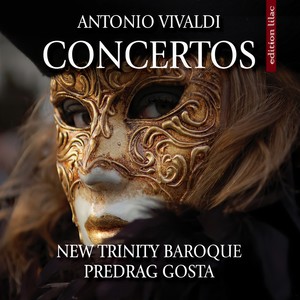
Vivaldi: Concertos (维瓦尔第:协奏曲集)
- 指挥: Predrag Gosta
- 乐团: New Trinity Baroque
- 发行时间:2010-12-18
- 译名:维瓦尔第:协奏曲集
- 类型:录音室专辑
- 歌曲
- 时长
-
作曲家:Antonio Vivaldi( 安东尼奥·卢奇奥·维瓦尔第)
-
作品集:Concerto for 2 Violins, Strings & Continuo in A minor, RV 522
-
作品集:Concerto for Cello, Strings & Continuo in D minor, RV 407
-
作品集:Concerto for Strings & Continuo in F major, RV 141
-
作品集:Concerto for Lute, 2 Violins & Continuo in D major, RV 93
-
作品集:Concerto for Strings & Continuo in G minor, RV 157
-
作品集:Concerto for Violin, Strings & Continuo in E minor, RV 273
-
作品集:Concerto for 2 Cellos, Strings & Continuo in G minor, RV 531
简介
Hailed by the critics as “Atlanta’s most adventurous early music ensemble” (The Atlanta Journal-Constitution), NEW TRINITY BAROQUE is recognized as one of the leading period instrument ensembles in the USA. Founded by Predrag Gosta in London in 1998, and now based in Atlanta (Georgia, USA), New Trinity Baroque was initially established as an ensemble of international musicians, and they continue to maintain this presence through working closely with American and international artists (past soloists have included British soprano Evelyn Tubb, Dutch recorder virtuoso Marion Verbruggen, American violinist Ingrid Matthews as well as British violinist John Holloway, British harpsichordist Steven Devine, and others). Always seeking variety, New Trinity Baroque’s repertoire ranges from chamber to orchestral, from cantatas to operas, and its styles from Renaissance to Classical. Their CD albums range from Baroque favorites such as Henry Purcell’s “Dido & Aeneas,” Pergolesi’s “Stabat Mater,” Violin Concertos by Bach or Monteverdi’s “Selva Morale e Spirituale” to works by Classical composers such as Mozart and Haydn, or Renaissance composers such as Palestrina and recently discovered master Francesco Portinaro. PREDRAG GOSTA, harpsichord, founder and artistic director of New Trinity Baroque, was born in Belgrade, Serbia, and has lived in the U.S. since 1998. Winner of several music competitions and scholarships (Leverhulme Trust, Vanderbilt Foundation) he studied at the Belgrade Music Academy and has received undergraduate and postgraduate degrees from Trinity College of Music in London and Georgia State University. He has performed at concerts and festivals in the U.S.A., England, Germany, Sweden, Finland, Poland, Serbia, Croatia, Montenegro, Russia, Bulgaria and Mexico, and in halls such as the Kennedy Center and the Strathmore Music Center. As conductor, he has performed with many period or symphonic ensembles, including the National Philharmonic in Washington DC, St. Petersburg’s State Capella “Glinka,” the Moscow Symphony Orchestra, the Belgrade Philharmonic, and others.

